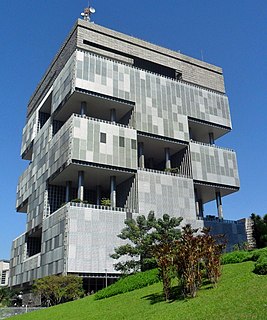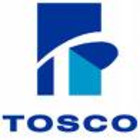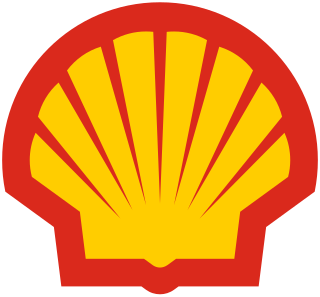Related Research Articles

Gulf Oil was a major global oil company from 1901 until March 15, 1985. The eighth-largest American manufacturing company in 1941 and the ninth-largest in 1979, Gulf Oil was one of the so-called Seven Sisters oil companies. Prior to its merger with Standard Oil of California, Gulf was one of the chief instruments of the Mellon family fortune; both Gulf and Mellon Financial had their headquarters in Pittsburgh.

Bantry Bay is a bay located in County Cork, Ireland. The bay runs approximately 35 km (22 mi) from northeast to southwest into the Atlantic Ocean. It is approximately 3-to-4 km wide at the head and 10 km (6.2 mi) wide at the entrance.

Marathon Petroleum Corporation is an American petroleum refining, marketing, and transportation company headquartered in Findlay, Ohio. The company was a wholly owned subsidiary of Marathon Oil until a corporate spin-off in 2011.

Petróleo Brasileiro S.A., better known by the acronym Petrobras, is a state-owned Brazilian multinational corporation in the petroleum industry headquartered in Rio de Janeiro, Brazil. The company's name translates to Brazilian Petroleum Corporation — Petrobras.

Hess Corporation is an American global independent energy company involved in the exploration and production of crude oil and natural gas. It was formed by the merger of Hess Oil and Chemical and Amerada Petroleum in 1968. Leon Hess served as CEO from the early 1960s through 1995, after which his son John B Hess succeeded him as chairman and CEO.

Whiddy Island is an island near the head of Bantry Bay, Ireland. It is approximately 5.6 km (3.5 mi) long and 2.4 km (1.5 mi) wide. The topography comprises gently-rolling glacial till, with relatively fertile soil. As late as 1880 the island had a resident population of around 450, mainly engaged in fishing and small-scale farming, but today the population has reduced to approximately 20 people. Previously home to Whiddy Island Naval Air Station the island is noted for its oil terminal facilities – and the related Whiddy Island Disaster.

Murphy Oil Corporation is a company engaged in hydrocarbon exploration headquartered in Houston, TX. The company recently closed all other offices in El Dorado, AR and Calgary, Alberta.

Kuwait Petroleum Corporation is Kuwait's national oil company, headquartered in Kuwait City.

Delek US Holdings, Inc. is a diversified downstream energy company with assets in petroleum refining, logistics, asphalt, renewable fuels and convenience store retailing headquartered in Brentwood, Tennessee.
The Whiddy Island disaster, also known as the Betelgeuse incident, occurred on 8 January 1979, around 1:00 am, when the oil tanker Betelgeuse exploded in Bantry Bay, at the offshore jetty for the oil terminal at Whiddy Island, Ireland. The explosion was attributed to the failure of the ship's structure during an operation to discharge its cargo of oil. The tanker was owned by Total S.A., and the oil terminal was owned and operated by Gulf Oil.

The Abu Dhabi National Oil Company or ADNOC is the state-owned oil company of the United Arab Emirates (UAE). As of November 2019, the UAE holds the sixth-largest proven reserves of oil in the world at 105 billion barrels. Most of these reserves are located in Abu Dhabi. It is the world's 12th largest oil company by production, producing 3.1 million barrels per day, with plans to increase production capacity to 4 million bpd by the end of 2020. It is the UAE's largest oil company.

Bharat Petroleum Corporation Limited (BPCL) is an Indian public sector oil and gas company headquartered in Mumbai, Maharashtra.The Corporation operates two large refineries of the country located in Kochi and Mumbai. The company is India's 2nd largest downstream oil company and is ranked 275th on the Fortune list of the world's biggest corporations as of 2019. BPCL ranked 672 in the Forbes 2018 list.

Hindustan Petroleum Corporation Limited (HPCL) is an Indian public sector oil and gas company. It is a subsidiary of ONGC with its headquarters in Mumbai, Maharashtra. It has a 25% market-share in India among public sector undertakings (PSUs) coupled with a strong marketing infrastructure. Its parent company is ONGC which owns a 51.11% stake in the company. The company is ranked 367th on the Fortune Global 500 list of the world's biggest corporations as of 2016. HPCL was removed from NIFTY 50 INDEX in March 2019 On 24 October 2019, the company became a Maharatna PSU.

Tosco was an independent US based petroleum refining and marketing corporation based in Stamford, Connecticut. It was founded in 1955 in Santa Monica, California by A&P heir Huntington Hartford, and originally focused on extracting oil from oil shale and developing alternative energy sources.

The Tanzania International Petroleum Reserves Limited (TIPER) is a joint venture between the Government of Tanzania (GoT) and Oryx Energies. It operates the largest oil terminal in the country, and will have a storage capacity of 213,200 m3 by 2015.

Royal Dutch Shell, commonly known as Shell, is a British-Dutch multinational oil and gas company headquartered in The Hague, Netherlands and incorporated in the United Kingdom as a public limited company (PLC). It is one of the oil and gas "supermajors" and the fifth-largest company in the world measured by 2020 revenues. In the 2020 Forbes Global 2000, Royal Dutch Shell was ranked as the 21st-largest public company in the world. Shell was first in the 2013 Fortune Global 500 list of the world's largest companies; in that year its revenues were equivalent to 84% of the Dutch national $556 billion GDP.

China National Offshore Oil Corporation, or CNOOC Group, is one of the largest national oil companies in China. It is the third-largest national oil company in the People's Republic of China, after CNPC and China Petrochemical Corporation. The CNOOC Group focuses on the exploitation, exploration and development of crude oil and natural gas in offshore China, along with its subsidiary COOEC.

The Ferndale Refinery in the northwest United States, owned by Phillips 66, is located in the Cherry Point Industrial Zone, west of Ferndale, Washington. The oil refinery had a capacity of 101,000 barrels per day in 2015, 64th largest in the nation, and it produces predominantly transportation fuels consumed in local markets. Its secondary processing facilities include a fluid catalytic cracker, an alkylation unit, hydotreating units, and a naphtha reformer. The plant follows a 10-5-3-2 crack spread, meaning that for ten barrels of crude feedstock, the refinery produces five barrels of gasoline, three barrels of distillate, and two barrels of fuel oil.

Trainer Refinery is an oil refining facility located in Trainer, Delaware County, Pennsylvania. The facility is about downstream from the Port of Chester and fifteen miles southwest of Philadelphia along the Delaware River. Stoney Creek is along its northern perimeter. The Trainer Refinery is owned by Monroe Energy, LLC, a subsidiary of Delta Air Lines. Monroe Energy acquired the facility in June 2012. Since that time, the company has focused on producing high-quality transportation fuels at the refinery. In addition to jet fuel, the facility also produces gasoline, diesel, and home heating oil.

The Petroleum and Submarine Pipe-lines Act 1975 is an Act of the Parliament of the United Kingdom which addressed the licensing, ownership, exploitation, production, transportation, processing and refining of petroleum and petroleum products in the UK. Enacted in 1975 when the UK’s first North Sea oil was produced, the Act aimed to provide greater public control of the oil industry. The Act established the British National Oil Corporation and a National Oil Account; modified the conditions of petroleum licences; controlled the construction and use of underground pipelines; and controlled the development of oil refineries.
References
- ↑ Roche, Dick (10 July 1990). "Report No. 02 - Irish National Petroleum Corporation Limited". Committee on Commercial State-Sponsored Bodies (6th Committee). Government of Ireland. Retrieved 20 June 2020.
- ↑ "Oil Facts in Ireland". Ireland: Department of Communications, Climate Action and Environment. Archived from the original on 13 May 2020. Retrieved 10 May 2020.
- ↑ Rabbitte, Pat (1 July 2014). "Written Answers: Irish National Petroleum Company". Dáil Éireann. Retrieved 10 May 2020– via KildareStreet.com.
- ↑ "Whitegate Refinery - Ireland's National Oil Refinery". Phillips 66 Whitegate Refinery. 2015. p. 4. Retrieved 30 January 2021– via issuu.com.Cite magazine requires
|magazine=(help) - 1 2 Peter D. Cameron; Michael Brothwood (2002). Competition in Energy Markets: Law and Regulation in the European Union. Oxford University Press. p. 236. ISBN 9780198257707.
- ↑ D. Palcic; E. Reeves (19 January 2011). Privatisation in Ireland: Lessons from a European Economy. Springer. pp. 92–95. ISBN 978-0-230-29757-9.
- ↑ Hogan, Dick (15 April 1998). "Bantry Bay oil terminal reopens". Irish Times. Archived from the original on 10 May 2020. Retrieved 30 January 2021.
- ↑ "Function: Background to NORA". National Oil Reserves Agency. Retrieved 20 June 2020.
- ↑ Slevin, Amanda (22 July 2016). Gas, oil and the Irish state. Manchester University Press. pp. 62–64, 74. ISBN 9781526100979.
- 1 2 O'Dea, Claire (1 August 2000). "US firm buys Whitegate in $100m deal". Irish Independent. Retrieved 30 January 2021.
- ↑ "Cabinet approves sale of Petroleum Corporation". RTE News. 28 May 2001. Retrieved 20 June 2020.
- ↑ Hennessy, Mark (29 May 2001). "Sale of Irish National Petroleum Corporation agreed for #116m". Irish Times. Archived from the original on 29 December 2018. Retrieved 20 June 2020.